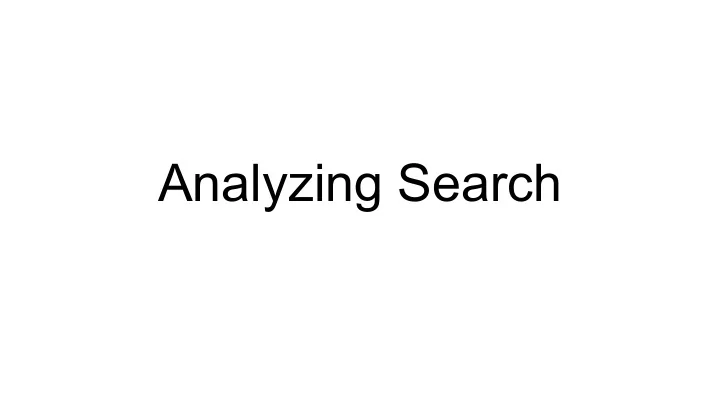

Analyzing Search
Generic search algorithm add start to frontier while frontier not empty get state from frontier if state is goal return end if for neighbor of state add neighbor to frontier end for end while
Uninformed Search Informed Search Given only the problem definition: Given: ● start state ● problem definition ● goal function ● heuristic to estimate cost-to-goal ● a way to generate successors A* Depth First ● frontier ordered by h(s) + c(s) ● FIFO frontier Greedy Breadth First ● frontier ordered by h(s) ● LIFO frontier Uniform Cost ● frontier ordered by c(s) h(s): heuristic value of state s c(s): cost to get to state s
Measuring Performance 1. Completeness : Is the search guaranteed to find a solution (if one exists)? 2. Optimality : Is the search guaranteed to find the lowest-cost solution? 3. Time complexity : How long does it take to find a solution? ○ How many nodes are expanded? 4. Space complexity : How much memory is needed to perform the search? ○ How many nodes get stored in frontier + visited? b: branching factor d: depth of the goal
Example Domain Given a Romanian road map, navigate from Arad to Bucharest.
Frontier DFS S, T, Z F, R, T, Z B, R, T, Z
Frontier DFS Z, T, S O, T, S T, S L, S M, S D, S C, S R, P, S P, S B, S
Frontier BFS S, T, Z T, Z, F, R Z, F, R, L F, R, L, O R, L, O, B L, O, B, C, P O, B, C, P, M B, C, P, M
Frontier UCS Z=75, T=118, S=140 T=118, S=140, O=146 S=140, O=146, L=229 O=146, R=220, L=229, F=239 R=220, L=229, F=239 L=229, F=239, P=317, C=366 F=239, P=317, M=299, C=366 P=317, M=299, C=366, B=450 M=299, C=366, B=418 C=366, D=374, B=418 D=374, B=418 B=418
Frontier h(A) = 366 A* S=393, T=447, Z=449 h(C) = 160 h(D) = 242 R=413, F=417, T=447, h(F) = 178 Z=449 h(L) = 244 P=415, F=417, T=447, h(M) = 241 Z=449, C=526 h(O) = 380 F=417, B=418, T=447, h(P) = 98 Z=449, C=526 h(R) = 193 B=418, T=447, h(S) = 253 Z=449, C=526 h(T) = 329 h(Z) = 374
Frontier h(A) = 366 Greedy S=253, T=329, Z=374 h(C) = 160 h(D) = 242 F=178, R=193, T=447, h(F) = 178 Z=449 h(L) = 244 B=0, R=193, T=447, h(M) = 241 Z=449 h(O) = 380 h(P) = 98 h(R) = 193 h(S) = 253 h(T) = 329 h(Z) = 374
BFS DFS UCS A* Greedy complete? Y N Y Y N optimal? N N Y Y N time efficient? !!! space efficient? !! !!
Devising Heuristics ● Must be admissible : never overestimate the cost to reach the goal. ● Should strive for consistency : h(s) + c(s) non-decreasing along paths. ● The higher the estimate (subject to admissibility), the better. Key idea: simplify the problem. ● Traffic Jam: ignore some of the cars. ● Path Finding: assume straight roads.
Clicker Question Why does A* need an admissible heuristic? a) required for completeness b) required for optimality c) improves time complexity d) improves space complexity e) some other reason
Clicker Question A* with an uninformative heuristic (example: h(s) = 5, ∀ s) is equivalent to: a) breadth first search b) depth first search c) uniform cost search d) greedy search e) none of these
Recommend
More recommend